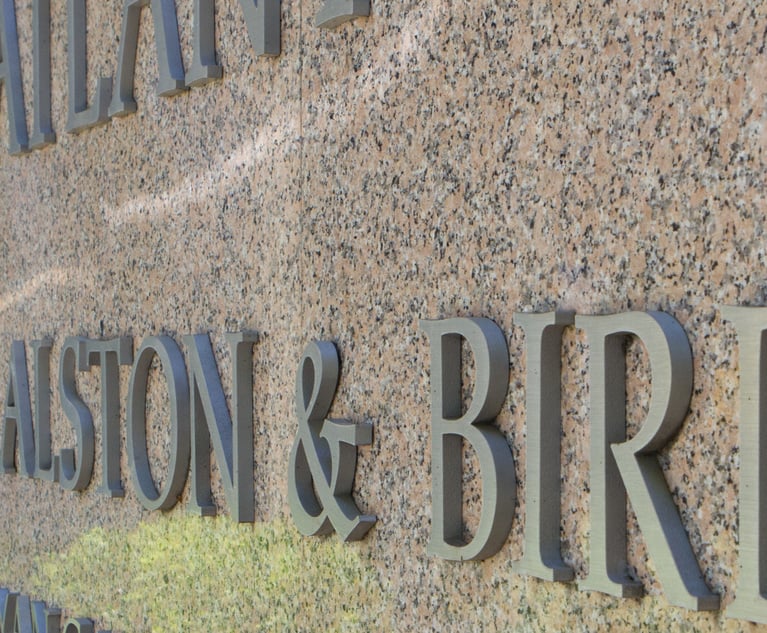 From left: Christopher Tayback, Kathleen Sullivan, William Burck, Sean Pak and Michael Carlinsky.
From left: Christopher Tayback, Kathleen Sullivan, William Burck, Sean Pak and Michael Carlinsky.A Force on Both Sides: Quinn Emanuel, Litigation Department of the Year Finalist
Quinn Emanuel knows the bet-the-company playbook for both plaintiffs and defendants.
December 29, 2019 at 08:00 PM
5 minute read
Quinn Emanuel Urquhart & Sullivan was no stranger to smartphone patent disputes when it went to trial for Qualcomm. And it was no stranger to Apple's patent litigation strategy.
The firm's intellectual property litigators had defended other tech companies, including Samsung, against Apple's own claims in the "smartphone wars," and they were fluent in Apple's damages theory, partner Sean Pak says. So with Apple now on defense, their ears perked up when things became a little too familiar.
"During trial, there was a moment when it felt like déjà vu, with Apple on the other side using examination questions that sounded an awful lot like examination questions we had used against Apple's expert" when Apple was the plaintiff, Pak says.
So Quinn Emanuel's team presented evidence showing that not long before, Apple had presented a similar expert at trial, with similar views as the Qualcomm expert on the stand.
"When companies are taking inconsistent positions, those are opportunities where, by being on both sides of the 'V,' we're able to take advantage of it," Pak says.
Regarding the firm's representation of both defendants and plaintiffs, name partner and appellate practice leader Kathleen Sullivan puts it simply: "It's a structural advantage of being litigation-only."
Partners: 264 Associates: 553 Other: 194 Department as Percentage of Firm: 100% Percentage of Firm Revenue: 100%
Only one firm among this year's finalists for Litigation Department of the Year can claim that structural advantage: Quinn Emanuel. As it approaches 34 years in existence, the 800-lawyer firm remains litigation-only. On that specialization, it's built a law firm business model that ranks among the most profitable in the world.
"It's just factual to say that our firm has done something that no other firm has done before," Sullivan says.
In court, she says, that means the firm has a deep knowledge of how to litigate cases for defendants and plaintiffs and an insider's insight about what the other party is likely to argue. Pointing to the Qualcomm case as an example, she says, "We knew Apple's playbook inside and out."
The firm's "spectacular courtroom victories" have also been a driving force in settlements, Sullivan notes, such as an accord between Waymo and Uber in the midst of trial last year. Waymo, formerly the self-driving car program at Google, sounded alarms when one of its scientists, Anthony Levandowski, went to work for Uber. By the time the two entities got to trial, the matter had been referred to federal prosecutors.
After the court approved Quinn Emanuel's plan to cross-examine ousted Uber CEO Travis Kalanick, and just before Waymo was set to call Levandowski as an adverse witness, the parties reached a $245 million settlement, including Uber's agreement not to use Waymo's self-driving car technology.
"We're a force in trials, not just to win trials but to bring about settlements," Sullivan says.
The firm's comfort level on either side of a case plays out in appellate work, too, Sullivan says, noting Quinn Emanuel's win for defendant Hyundai before an en banc panel of the Ninth Circuit in litigation over its fuel efficiency. As a result of the en banc reargument, a settlement approved at the district court level was reinstated, and a decertification of the settlement class was reversed. The firm says getting that reversal was a victory not just for its client but for the plaintiffs bar as a whole, as it permitted a less stringent standard for class certification.
"Our firm has the credibility to do that because it is known that we are a plaintiffs class action firm as well as a defense firm," Sullivan says.
That ability to reach an accord caught the eye of Donald Rosenberg, then in-house at IBM, when he got to know name partner Bill Urquhart in the 1990s and started to use Quinn Emanuel. Urquhart, who died in October, was largely credited as Quinn Emanuel's chief recruiter, having brought some of its most successful litigators on board.
Rosenberg left IBM in 2006 to join Apple and "lost some of that connection" with Quinn Emanuel, he says. But when he took the GC role at Qualcomm, he found himself opposite the firm, which was representing Nokia in a case against Qualcomm.
"When I told [Urquhart] I was going to Qualcomm, his first reaction was maybe the two of us can find a way to settle cases," Rosenberg says. "Within about a year we settled the Nokia litigation, in some part because of Bill and me working through things."
Once that matter had settled and conflicts were no longer a concern, Rosenberg was eager to work with Quinn Emanuel litigators on Qualcomm matters, he says. Most recently, that meant the worldwide litigation against Apple. The San Diego litigation was intertwined with matters in Germany, the U.K. and China, and before the International Trade Commission.
"For me it was a no-brainer to get them involved in these cases," Rosenberg says.
While being the no-brainer choice is a result of the firm's litigation-only model, firm founder John Quinn says, that doesn't mean it comes easy.
"There really aren't any short-cuts. There aren't any geniuses with brilliant ideas that let you cut through the hard work and pull a rabbit out of the hat," he says. "We have to earn our position in our standing with the client and in the market place every single day and in every case we litigate."
This content has been archived. It is available through our partners, LexisNexis® and Bloomberg Law.
To view this content, please continue to their sites.
Not a Lexis Subscriber?
Subscribe Now
Not a Bloomberg Law Subscriber?
Subscribe Now
NOT FOR REPRINT
© 2024 ALM Global, LLC, All Rights Reserved. Request academic re-use from www.copyright.com. All other uses, submit a request to [email protected]. For more information visit Asset & Logo Licensing.
You Might Like
View All
A&O Shearman, Hogan Lovells and the Stories That Shaped Africa This Year
4 minute read
Bottoming Out or Merging Up? Law Firms That Shuttered in 2024

Law Firms Mentioned
Trending Stories
- 1'Largest Retail Data Breach in History'? Hot Topic and Affiliated Brands Sued for Alleged Failure to Prevent Data Breach Linked to Snowflake Software
- 2Former President of New York State Bar, and the New York Bar Foundation, Dies As He Entered 70th Year as Attorney
- 3Legal Advocates in Uproar Upon Release of Footage Showing CO's Beat Black Inmate Before His Death
- 4Longtime Baker & Hostetler Partner, Former White House Counsel David Rivkin Dies at 68
- 5Court System Seeks Public Comment on E-Filing for Annual Report
Who Got The Work
Michael G. Bongiorno, Andrew Scott Dulberg and Elizabeth E. Driscoll from Wilmer Cutler Pickering Hale and Dorr have stepped in to represent Symbotic Inc., an A.I.-enabled technology platform that focuses on increasing supply chain efficiency, and other defendants in a pending shareholder derivative lawsuit. The case, filed Oct. 2 in Massachusetts District Court by the Brown Law Firm on behalf of Stephen Austen, accuses certain officers and directors of misleading investors in regard to Symbotic's potential for margin growth by failing to disclose that the company was not equipped to timely deploy its systems or manage expenses through project delays. The case, assigned to U.S. District Judge Nathaniel M. Gorton, is 1:24-cv-12522, Austen v. Cohen et al.
Who Got The Work
Edmund Polubinski and Marie Killmond of Davis Polk & Wardwell have entered appearances for data platform software development company MongoDB and other defendants in a pending shareholder derivative lawsuit. The action, filed Oct. 7 in New York Southern District Court by the Brown Law Firm, accuses the company's directors and/or officers of falsely expressing confidence in the company’s restructuring of its sales incentive plan and downplaying the severity of decreases in its upfront commitments. The case is 1:24-cv-07594, Roy v. Ittycheria et al.
Who Got The Work
Amy O. Bruchs and Kurt F. Ellison of Michael Best & Friedrich have entered appearances for Epic Systems Corp. in a pending employment discrimination lawsuit. The suit was filed Sept. 7 in Wisconsin Western District Court by Levine Eisberner LLC and Siri & Glimstad on behalf of a project manager who claims that he was wrongfully terminated after applying for a religious exemption to the defendant's COVID-19 vaccine mandate. The case, assigned to U.S. Magistrate Judge Anita Marie Boor, is 3:24-cv-00630, Secker, Nathan v. Epic Systems Corporation.
Who Got The Work
David X. Sullivan, Thomas J. Finn and Gregory A. Hall from McCarter & English have entered appearances for Sunrun Installation Services in a pending civil rights lawsuit. The complaint was filed Sept. 4 in Connecticut District Court by attorney Robert M. Berke on behalf of former employee George Edward Steins, who was arrested and charged with employing an unregistered home improvement salesperson. The complaint alleges that had Sunrun informed the Connecticut Department of Consumer Protection that the plaintiff's employment had ended in 2017 and that he no longer held Sunrun's home improvement contractor license, he would not have been hit with charges, which were dismissed in May 2024. The case, assigned to U.S. District Judge Jeffrey A. Meyer, is 3:24-cv-01423, Steins v. Sunrun, Inc. et al.
Who Got The Work
Greenberg Traurig shareholder Joshua L. Raskin has entered an appearance for boohoo.com UK Ltd. in a pending patent infringement lawsuit. The suit, filed Sept. 3 in Texas Eastern District Court by Rozier Hardt McDonough on behalf of Alto Dynamics, asserts five patents related to an online shopping platform. The case, assigned to U.S. District Judge Rodney Gilstrap, is 2:24-cv-00719, Alto Dynamics, LLC v. boohoo.com UK Limited.
Featured Firms
Law Offices of Gary Martin Hays & Associates, P.C.
(470) 294-1674
Law Offices of Mark E. Salomone
(857) 444-6468
Smith & Hassler
(713) 739-1250











